Building Ecommerce Store: Understanding the Costs
Launching an Ecommerce store is exciting, but understanding the costs is key! This article breaks down 6 main areas you’ll need to budget for, like hosting, payment processing, ecommerce website design, ecommerce website development and add-ons.
It also helps you choose the right platform based on your budget and needs. Think user-friendly and affordable for starters, or highly customised and scalable for established businesses. Remember, start small, prioritise core features, and choose a solution that grows with you!
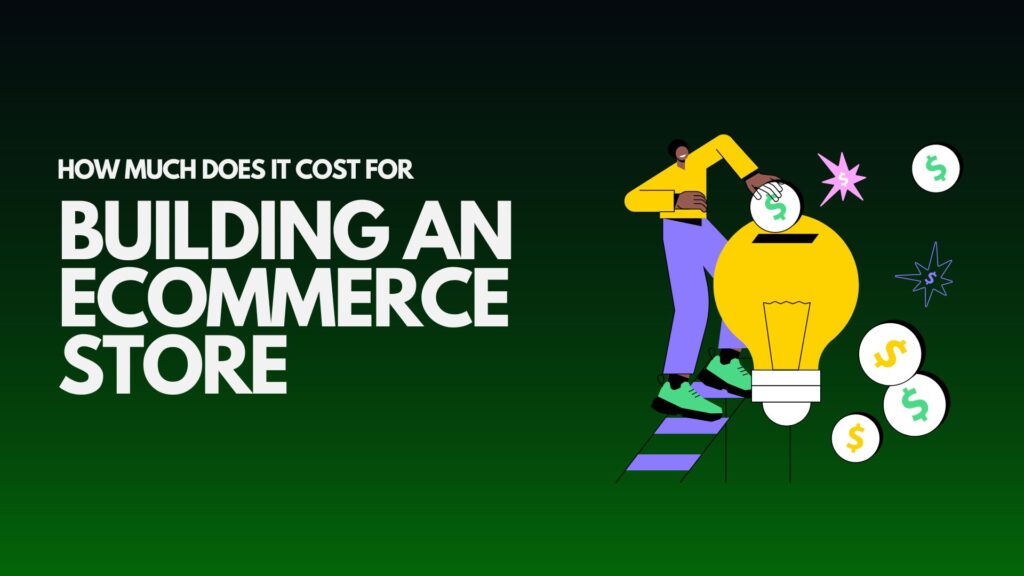
Choosing Your Path: Ecommerce Website Builder vs. Web Development Company
Choosing the right platform for your online store boils down to two main options:
- Ecommerce website builders
- Ecommerce development companies
Each path has its own cost implications, so let’s explore the factors that impact your budget.
1.Ecommerce website builder
Starting Affordable, But Scaling Can Add Up
Ecommerce website builders are typically the least expensive way to build an online store. Using free, open-source platforms are attractive, but you end up paying for hosting, themes, plug-ins, and even help from a developer if you have specific needs, all of which can increase your total cost. Here’s the breakdown:
Pros:
- Budget-friendly: Plans start at $39 per month, even for stores with physical locations.
- Fast setup: Pre-built templates and intuitive interfaces get you up and running quickly.
- Limited technical knowledge required: No coding needed, ideal for beginners.
Cons:
- Limited customization: You’re tied to the platform’s features and templates.
- Hidden costs: Free themes might lack functionality, leading to paid app subscriptions.
- Scalability concerns: As your store grows, hosting upgrades and custom development can get expensive.
Ecommerce Website Builders are Best for
- Entrepreneurs with limited technical knowledge.
- Businesses needing a quick and affordable online presence.
- Stores expecting moderate traffic and product volume.
2.Ecommerce Development Companies
Customised Solutions, Higher Costs
Hiring a professional ecommerce web development team offers flexibility and control over your store’s look and feel. However, be prepared for a higher price tag.
Pros:
- Highly customized: Tailor your store to your specific needs and brand identity.
- Full control: Access every aspect of your store’s functionality and features.
- Scalability: Geared towards handling large product volumes and high traffic.
Cons:
- Significant upfront costs: Development fees can range from $2,000 to $20,000+ depending on complexity.
- Ongoing maintenance: May require additional costs for updates and bug fixes.
- Longer development time: Building from scratch takes more time than using pre-built solutions.
Ecommerce Development Companies are Best for
- Established businesses with unique needs and branding.
- Stores expecting high traffic and complex product variations.
- Businesses willing to invest in a tailored, scalable solution.
Understanding Key Cost Components
Beyond platform choice, several other factors influence your online store’s cost:
- Domain registration: $10–$30 annually
- Web hosting: $5–$250 monthly (depending on the hosting plan and provider)
- SSL certificate: $0 (complimentary with some hosting providers) to $200 yearly
- Ecommerce platform:
- Open-source (WooCommerce, Magento, or PrestaShop): No cost to download, but there may be charges for extensions, plugins, and themes
- Hosted solutions (Shopify, BigCommerce, or Wix): $20 to $300 monthly, based on the plan and features
- Website design and development:
- Prebuilt themes: $0–$200
- Custom design and development: $2,000–$20,000+, depending on the complexity, features, and functionality needed
- Additional costs:
- Payment gateway fees: Varies according to the provider (PayPal, Stripe, Shop Pay) and transaction volume
- Digital marketing and advertising: Varies depending on the budget and strategy
- Website maintenance and support: Varies based on the degree of support required
Understanding the Costs of Your Dream Ecommerce Website: 6 Point Guide
This guide helps you navigate the six main costs involved, with extra context and personalized tips to match your goals.
1. Hosting
Think of hosting as your store’s virtual foundation. It stores your website’s files and makes them accessible to customers – like renting a prime location in the digital world.
Prices: $2.49 per month to upwards of $1,000
*The cost depends on a variety of factors, such as how much traffic your store gets and any extra services you may need, such as automated backups
Regardless, every website needs hosting to store its files. You’ll also need a domain name, which is like the digital home for your ecommerce store.
Options:
- SaaS Platforms (e.g., Shopify): All-inclusive monthly fees cover hosting, security, and updates. Perfect for beginners, but customization can come at a higher cost.
- Self-Hosted Platforms (e.g., WooCommerce): Lower start-up costs, but require separate hosting accounts and domain names. Think of it as building your own store – more control, but more technical work.
Hosting cost estimates
- SaaS-hosted: As low as $39 per month with unlimited hosting.
- Self-hosted: Between $2.75 and $2,000 per month with incremental upgrades.
Which one fits you?
- Starting small? SaaS platforms like Shopify offer quick and easy setup.
- Tech-savvy and looking for ultimate control? Self-hosting might be your jam.
- Focus on design and ease of use? Prioritize platforms with built-in hosting.
SaaS ecommerce platform hosting
Ecommerce platforms like Shopify do not require you to install, manage, or host a domain on your own. Everything you need is included in your monthly subscription fee.
Secure hosting comes with every Shopify plan, which includes:
- Secure hosting comes with every Shopify plan, which includes:
- Unlimited bandwidth, so you don’t have to worry about paying more if you get more traffic
- Level 1 PCI compliance, which keeps customer data secure
- Blazing fast servers and instant updates, so you never miss out on the latest features
- An SSL certificate to prevent fraud and build customer trust
- A reliable content management system to handle site content
- Unlimited email forwarding
You’ll just need to buy and register a domain name separately
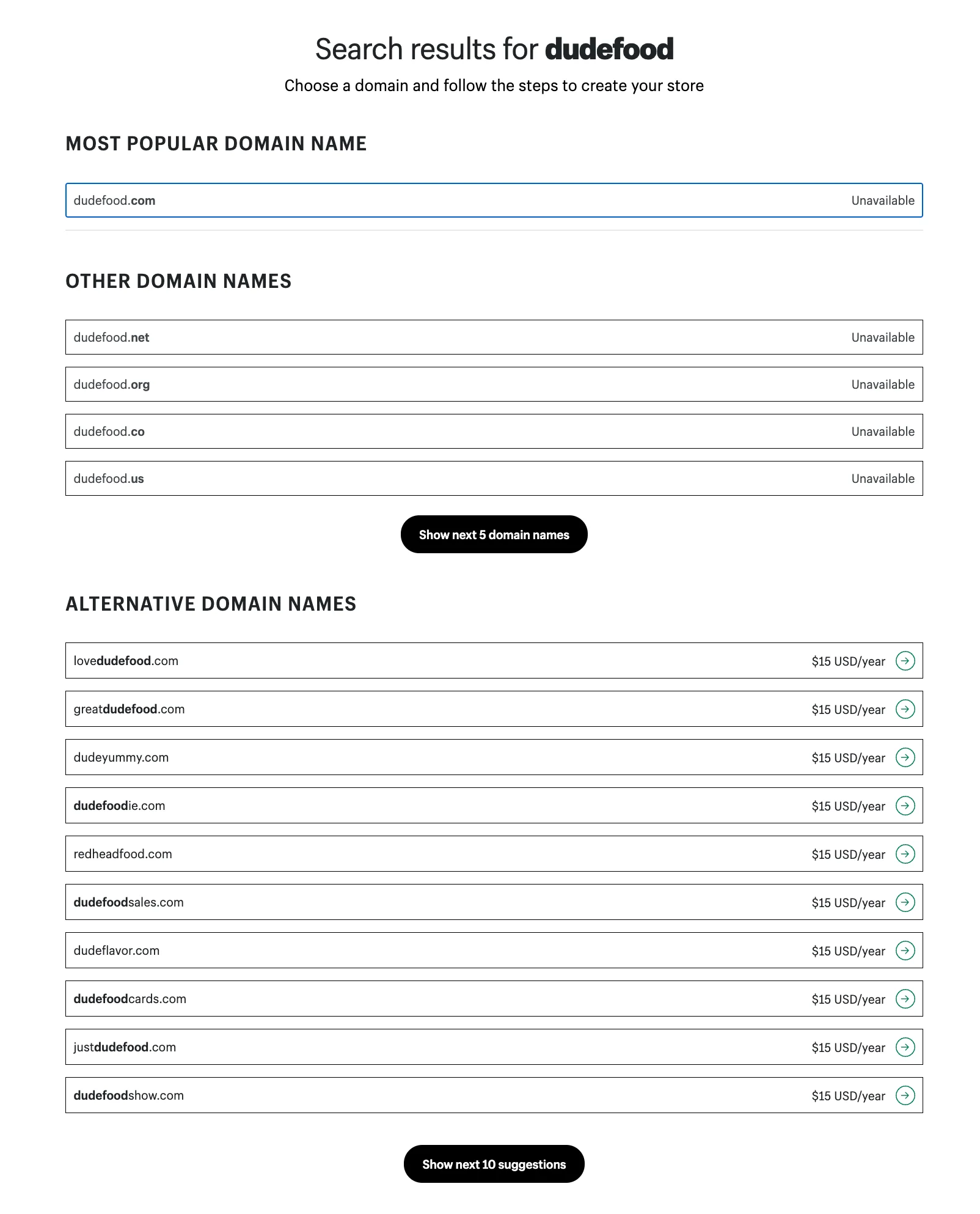
Self-hosted ecommerce website
Some ecommerce website builders like WooCommerce (a plug-in for WordPress) and Magento are free. But you need to have an account with an ecommerce hosting provider to manage your files and purchase a domain.
Some costs you’ll incur when self-hosting your website include:
- An ecommerce hosting account, which starts at $7.99 per month
- A domain name, which can cost around $15 per year
- An SSL certificate, which starts at $69 per year
There are some web hosts like Bluehost that offer services with a free domain name and SSL certificate for $2.75 per month.
The one drawback is that as your ecommerce store grows, you’ll need to upgrade your hosting plan to manage traffic increases. If you end up with a high-volume website, self-hosting can cost you upward of $1,000 to $2,000 per month.
2. Payment Processing: Frictionless Transactions
This lets customers pay smoothly, ensuring a happy shopping experience and repeat business. Think of it as having reliable cashiers for your online store.
Prices: 2.9% + $0.30 per transaction (varies by platform)
Tip: Many platforms offer built-in processing options like Stripe or Shopify Payments, saving you extra fees.
Payment processing costs depend on the plan you have with your ecommerce platform. For example, the Shopify Basic plan has a processing fee for online credit card payments of 2.9% plus 30¢ per transaction. The Advanced Shopify plan has a fee of 2.4%. If you are taking payments in-person, the fee is lower because there is lower fraud risk.
Every Shopify plan comes with Shopify Payments, which helps you start selling right away. Once you turn on Shopify Payments, you can accept credit cards and other popular payment gateways like Shop Pay, Apple Pay, and G Pay.
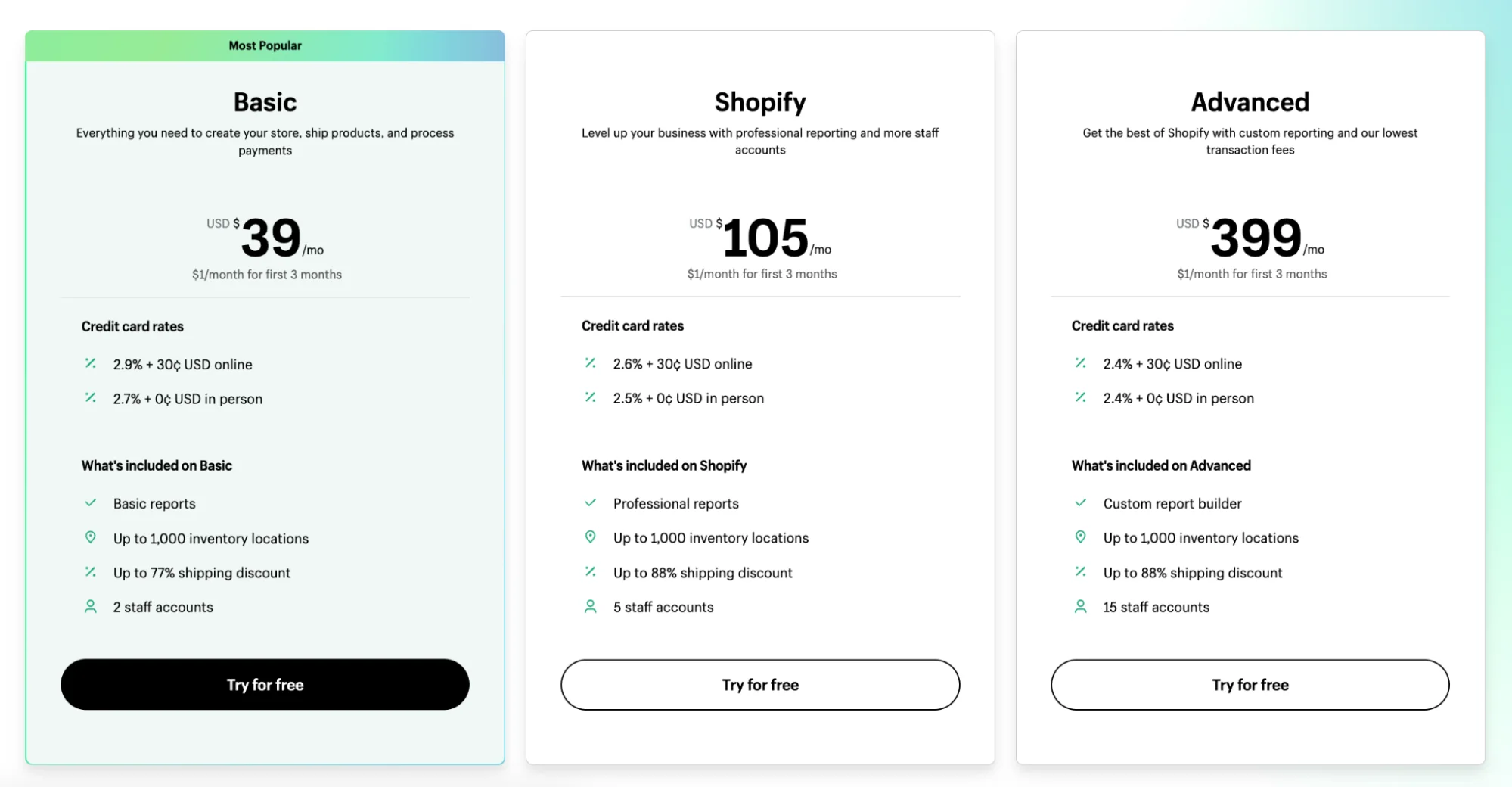
3. Ecommerce Design: Your Brand’s First Impression
Your store’s design is crucial for attracting customers and building trust. Imagine it as your shop’s window display – you want it to be eye-catching and reflect your brand personality.
Options:
- Pre-made Themes: Affordable and easy to customize, great for beginners.
- Custom Themes: Unique and perfectly tailored to your brand, but require developer expertise and cost more.
- Prices: Free themes to $500 and beyond for custom design
Agency pricing for custom themes
Basic Ecommerce web design services typically start at $500 to $1,000 for basic turnkey graphics or template creation. While it’s possible to find a new agency willing to design your entire ecommerce store for $500 to $2,000, often the quality matches the price. Established ecommerce design agencies usually charge between $5,000 and $20,000 for a custom-designed ecommerce website.
These templates come set with everything you need to start your store:
- Homepage
- Product pages
- Shopping cart
- Checkout page
- FAQ
- About pages
If you are option for Shopify, Shopify Themes offer over 100 free and paid themes to help you find the right look and feel for your store. You can find themes based on categories like video and 3D products, big imagery, large inventories, minimalist style, fun and lively, and more.

Which one should you choose?
- Just starting out? Pre-made themes offer a variety of styles and are easy to personalize.
- Craving a unique look and feel? Invest in a custom theme once your brand identity is established.
4. Custom Development: Beyond the Basics
Need unique features or complex functionality? Think of it as adding special touches to your store, like a personalized touch screen checkout.
Custom ecommerce website development costs are related to designing, deploying, and maintaining your store for specific business needs. Store owners can work with developers to create custom storefronts or tweak Ecommerce themes.
For Shopify, If you have additional functionality or require additional development work, this can quickly add to the price of your Shopify development project
Who can help you with Shopify Development
- Shopify Developer
- Shopify Development company
Prices: $550+ (varies by project)
Let’s delve into the expenses associated with hiring a Shopify developer.
Typically, most Shopify Developer charge an hourly rate, which varies depending on the level of expertise required. In the United States and Canada, hiring a Shopify developer can start at $50 per hour and go up to $150 per hour for highly experienced professionals.
In Eastern countries, the rates for Shopify experts are comparatively lower. You can easily find a skilled Shopify developer from Asia for rates as low as $25 per hour, with rates going up to $50 per hour for more experienced professionals.
The following are the starting rates of Shopify developers on Upwork, a popular freelance platform:
- Beginner: $15 per hour
- Intermediate: $33 per hour
- Expert: $95 per hour
The median rate of Shopify developers on Upwork ranges from $15 to $29 per hour.
Many developers also offer fixed rates based on the project requirements. On average, hiring a Shopify developer for your store may cost between $500 and $25,000, depending on the level of customization required.
According to Glassdoor, the national average salary of a Shopify developer in the United States is $88,694, which you may consider if you are thinking of hiring someone full-time.
And for Shopify development companies, For basic Shopify web development services, most agencies typically charge between $500 and $1,000 for basic website. While it’s possible to find a fledgling agency to develop your entire Shopify store for $500 to $2,000, more often than not, you’ll get what you pay for. The costs for most established Shopify development agencies range from $5,000 to $20,000 for a custom-developed Shopify website.
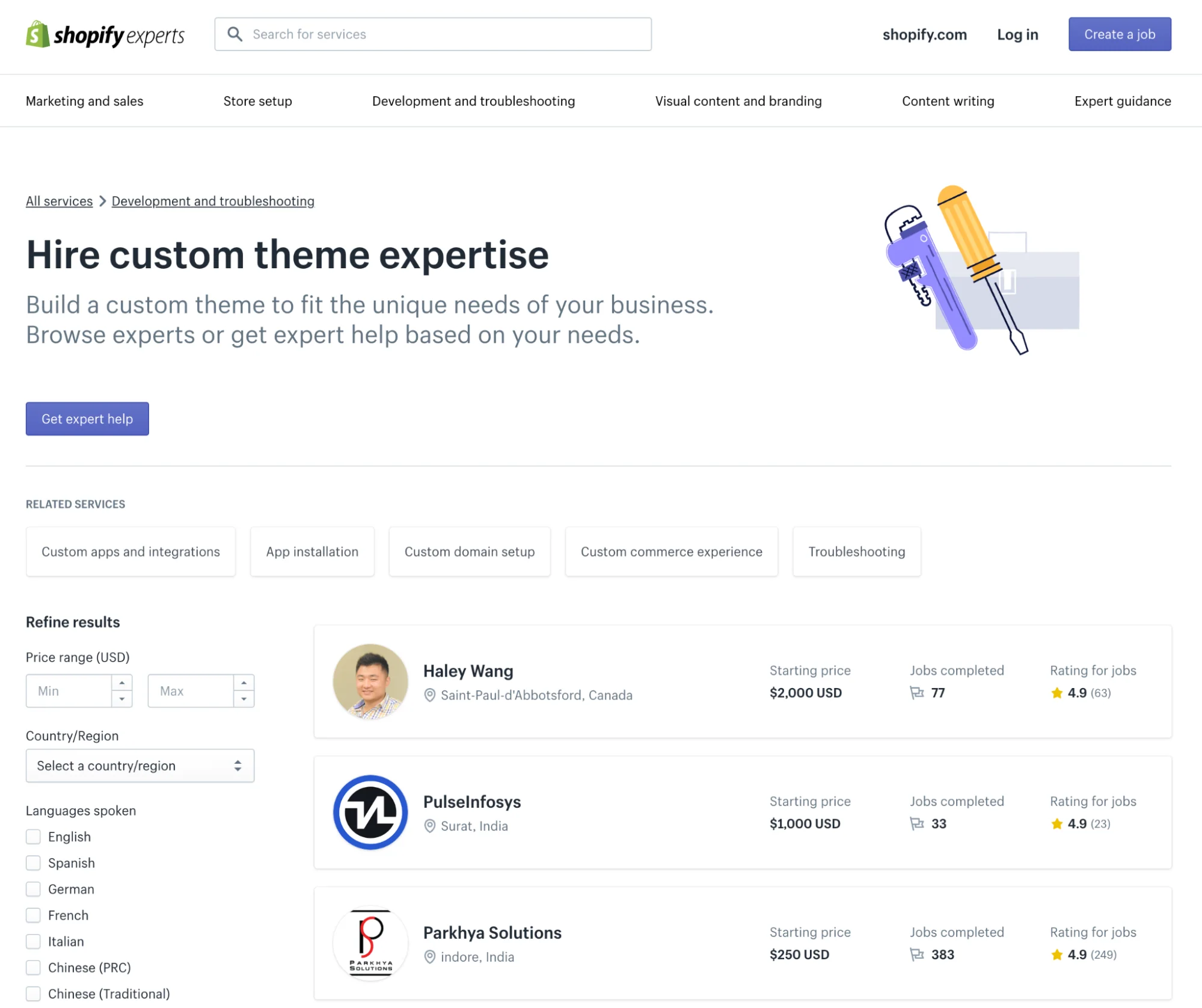
5. Add-Ons and Extensions
It’s nearly impossible for one ecommerce software to satisfy the needs of every ecommerce business. Chances are, you’ll want to add a few features to your website.
Think of these as apps that add specific features, like email marketing or social media selling. Imagine them as helpful assistants in your store, each specializing in a particular task.
Prices: Free to $5,000+ (for custom apps)
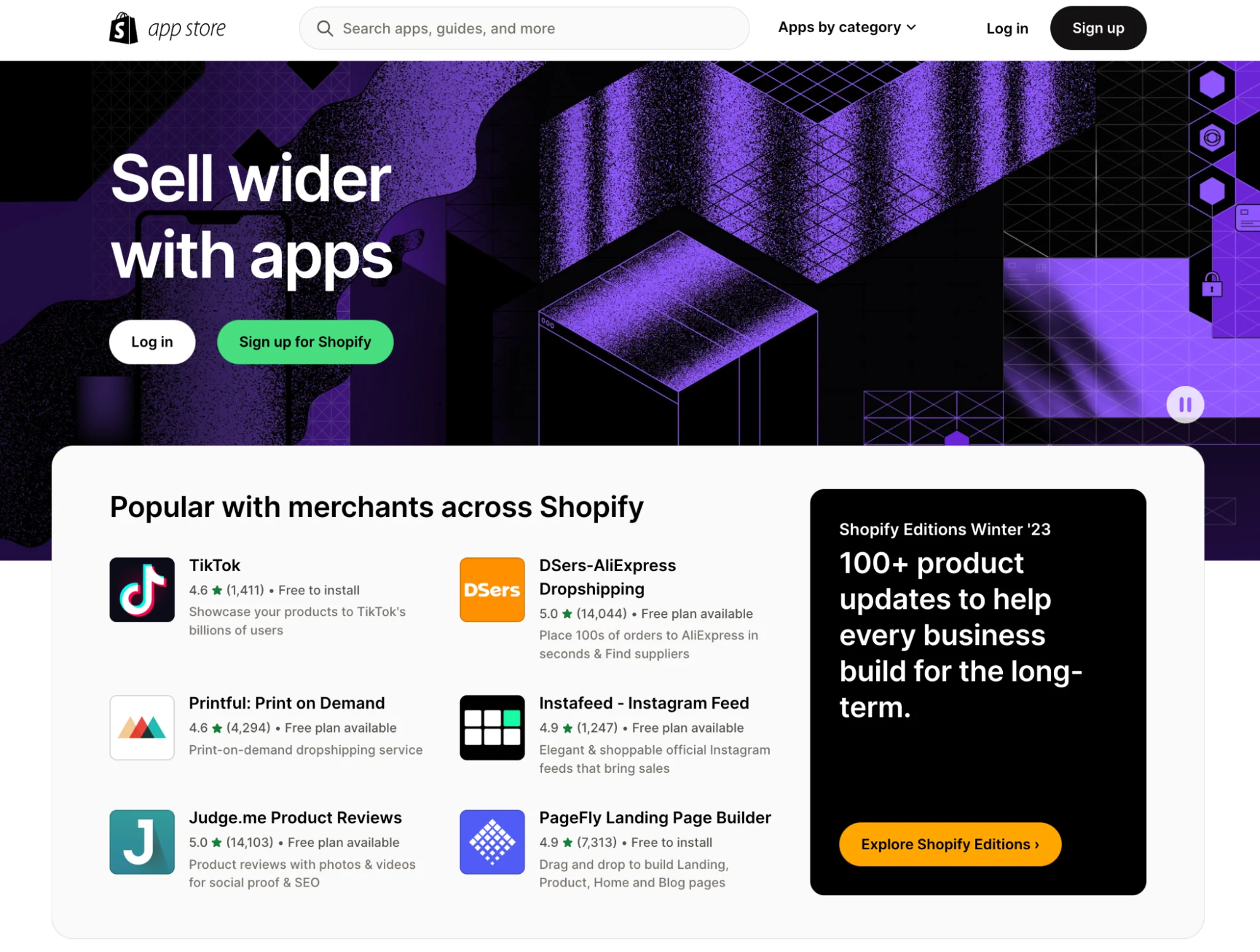
The price for paid apps varies. Most are available on a monthly subscription basis. You can also add private apps made specifically for your store.These apps are stored and run on another server, but you can generate Shopify API keys to give the app access permissions.
Tip: Explore free apps first to see what works for you. Invest in paid apps only when they offer essential functionality.
6. Business Costs: The Bigger Picture
Budget is always a consideration. You can launch an ecommerce website for as little as $100, but you’ll likely have to spend more than that to get your business moving.
Running a successful online store goes beyond the website itself. Consider marketing, inventory, shipping, and other expenses. Think of it as all the ingredients needed to run a thriving business.
To drive traffic to your store , you need to consider following
Remember, building your ecommerce website is only half of the battle – driving traffic to your website is a must. On average 43% of eCommerce website sales come from Google and other search engines, so it is super important to appear at the top of the search results for your most often searched keywords. You should work with an SEO company to develop a full keyword list and search engine marketing plan.
According to shopify latest research, most small business owners spend around $40,000 in their first year, with 9% of that allocated to online business needs. (Shopify merchants spend an average of $38,000, while non-Shopify merchants average around $41,000.)
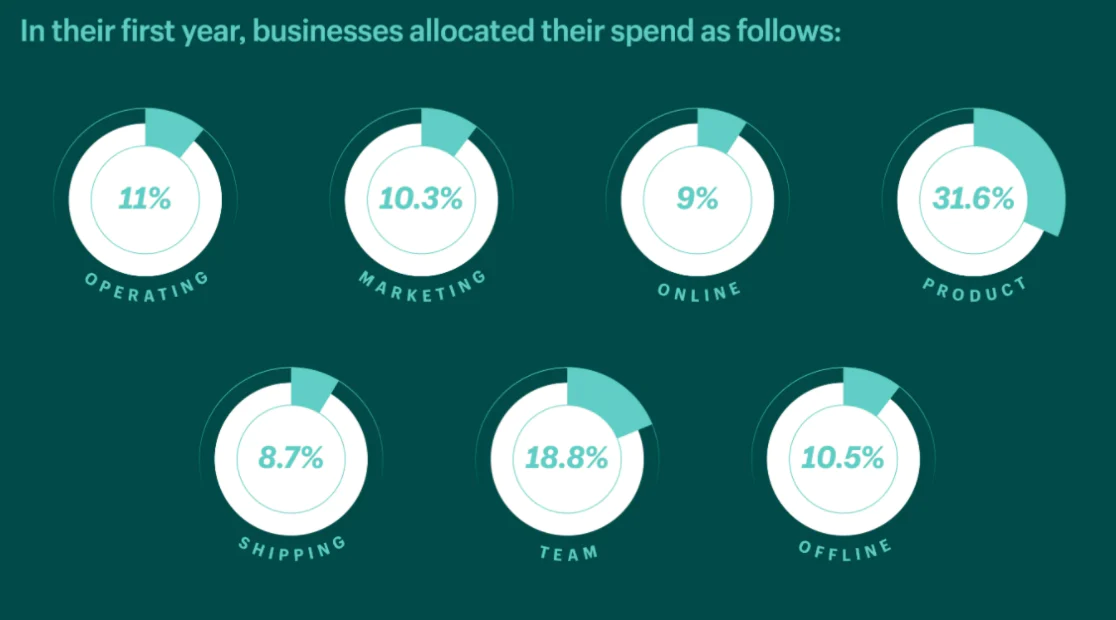
It takes time to turn a profit for an online business. So, choose an ecommerce platform that won’t take up your entire budget and gives you the tools you need to succeed.
Focus on where your business is now and where you want it to go in the future. Then find an ecommerce platform that will help you get there.
Tip: Start small and scale up as your business grows. Choose an ecommerce platform that fits your budget and future needs.
Remember:
- Launching an online store can be affordable, but long-term success requires investment.
- Shopify offers a good starting point with its built-in features and affordable plans.
- Focus on essential costs first and add features gradually as your business grows.
With this personalized guide, you’re well-equipped to understand the costs involved and build a budget-friendly ecommerce website that reflects your vision and paves the way for success!
Looking for top-notch ecommerce design and development services? Our ecommerce development company offers expert ecommerce website design and development services, including Shopify website design. We’re a leading ecommerce development service with a team of skilled Shopify web developers and designers. Whether you’re starting an ecommerce business or need to build a custom ecommerce website, our ecommerce development agency has you covered. Contact us for the best ecommerce website design and development solutions!

